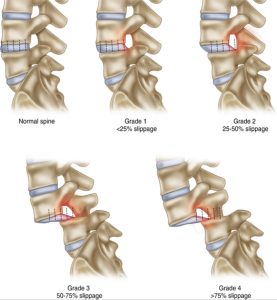By Rachel Long, PT, DPT
Spondylolisthesis, or slipped vertebra, is a condition that involves the forward slippage of one vertebra over another. It mostly occurs in the lumbar spine (lower back), but also may be present in the mid to upper back or in the neck.

https://images.app.goo.gl/6wBCujZM7Fy38yyk6
Spondylolisthesis can be caused by repetitive trauma to the spine, a birth defect, arthritis of the spine causing the joints to become worn, or a bone abnormality.
Many people with spondylolisthesis do not have pain. Others may experience back pain that is worse with activity and often relieved when laying down. Pain, numbness, or tingling may go into the legs if the bone of the spine is pressing on a nerve. Patients with spondylolisthesis may also complain of stiffness or tenderness in the back and often have decreased flexibility in their legs (most commonly the hamstring muscle).
The majority of patients with symptomatic lumbar spondylolisthesis and an absence of neurologic deficits (Numbness/tingling/weakness) will do well with conservative care1. Physical therapy can effectively manage symptoms related to spondylolisthesis.
Education is provided to identify and change any external factors that are contributing to pain. This can include postural re-education, body mechanics with daily and work specific activities, assessment and recommendations on footwear, assessing and discussing walking mechanics, and review of patient involvement in specific types and amount of exercise. These recommendations can diminish current symptoms and prevent recurrence.
Targeted exercises are prescribed to strengthen stabilizing muscles in the spine, lower abdomen, hips and legs. Flexibility exercises are also important to reduce strain on the back. A home exercise program is created for self-management of pain and spinal stability.
Manual “hands-on” techniques may include soft tissue techniques (such as massage) for tight and sore muscle groups, as well as stretching of muscles and mobilization of nerves if needed.
At Lifeline Physical Therapy, our clinicians provide expert care to treat symptoms and impairments of spondylolisthesis and reduce or eliminate the impact on current function.
References:
- https://www.spine.org/Portals/0/assets/downloads/ResearchClinicalCare/Guidelines/Spondylolisthesis.pdf

